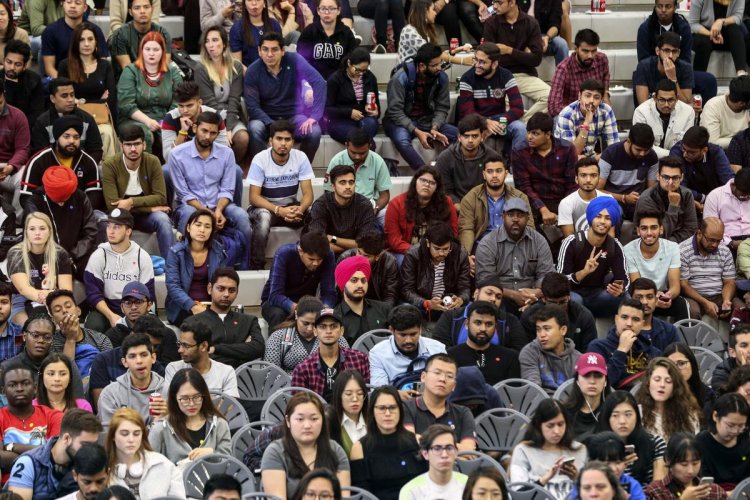Ottawa to lift 20-hour weekly work cap for international students
OTTAWA—International students in Canada will be allowed to work off campus as many hours as they want beginning Nov. 15 — a change that comes as businesses struggle to fill job vacancies across the country. Immigration Minister Sean Fraser announced on Friday that the temporary program would run to the end of 2023, and will only apply to full-time students.“This is a good news day not just for international students, but for Canadian businesses,” said Fraser, adding that this change is also going to help sustain Canada’s post-pandemic growth.In the second quarter of 2022, Canada reported more than one million job vacancies.Lifting the 20-hour work limit will allow more than 500,000 international students now living in Canada to more easily get part-time jobs and offer them more full-time opportunities in their field of study.Previously, study permit holders enrolled in a designated post-secondary program were allowed to work up to 20 hours a week off-campus. While this cap excluded summer months and on-campus jobs, it limited the opportunity to gain Canadian work experience — an important component to qualify for permanent residence. “This is great news” said Christian Fotang, chair of the Canadian Alliance of Student Associations. “It also opens up conversations on other barriers, such as eliminating the requirement for a work permit on top of a study permit for internships and co-ops within Express Entry.” With the new measure, international students will have an opportunity to offset rising tuition fees and living expenses. Advocates say the lifting of the cap will also help to stop workplace exploitation and abuse.“It’s a step in the right direction. This change must be made permanent,” said Sarom Rho, the organizer for Migrant Students United at the Migrant Workers Alliance for Change, adding that “this gives them the power to protect themselves from exploitation, abuse and mistreatment at work.”Harshill Dhingra, a former international student at Humber College, said he is “so happy to see our efforts are paying off.” He said he was afraid and had to keep his silence when he injured his finger at a restaurant job where he worked for cash with no paperwork. Adri Ananya, an undergraduate international student at York University, was also happy with the news, saying, “It was really hard to find jobs with the 20-hour limitation. I work two jobs right now to make ends meet. But now I can find a full-time job or ask my boss to increase my hours.”By addressing these concerns, the measure will create “better opportunity for students to not fall victim to an individual employer they may be beholden to,” Fraser said.He also announced a pilot program that would automatically extend study permits for eligible applicants, in an effort to resolve a months-long backlog.International students are a large part of the labour market working in places such as gas stations, restaurants, grocery stores, and factories. Each year, international students contribute $22 billion to the Canadian economy through their expenses and tuition.Although COVID-19 lockdowns and travel restrictions have greatly hampered the processing capacity of Canada’s immigration system, officials have continued to issue a high volume of study permits.More than 452,000 study permit applications have been processed since Jan. 1. Officials say during the same period in 2021, which was a record year, 367,000 applications were processed. Irem Koca is an Ottawa-based general assignment reporter for the Star. Reach her via email: ikoca@thestar.caNicholas Keung is a Toronto-based reporter covering immigration for the Star. Follow him on Twitter: @nkeung


OTTAWA—International students in Canada will be allowed to work off campus as many hours as they want beginning Nov. 15 — a change that comes as businesses struggle to fill job vacancies across the country.
Immigration Minister Sean Fraser announced on Friday that the temporary program would run to the end of 2023, and will only apply to full-time students.
“This is a good news day not just for international students, but for Canadian businesses,” said Fraser, adding that this change is also going to help sustain Canada’s post-pandemic growth.
In the second quarter of 2022, Canada reported more than one million job vacancies.
Lifting the 20-hour work limit will allow more than 500,000 international students now living in Canada to more easily get part-time jobs and offer them more full-time opportunities in their field of study.
Previously, study permit holders enrolled in a designated post-secondary program were allowed to work up to 20 hours a week off-campus. While this cap excluded summer months and on-campus jobs, it limited the opportunity to gain Canadian work experience — an important component to qualify for permanent residence.
“This is great news” said Christian Fotang, chair of the Canadian Alliance of Student Associations. “It also opens up conversations on other barriers, such as eliminating the requirement for a work permit on top of a study permit for internships and co-ops within Express Entry.”
With the new measure, international students will have an opportunity to offset rising tuition fees and living expenses. Advocates say the lifting of the cap will also help to stop workplace exploitation and abuse.
“It’s a step in the right direction. This change must be made permanent,” said Sarom Rho, the organizer for Migrant Students United at the Migrant Workers Alliance for Change, adding that “this gives them the power to protect themselves from exploitation, abuse and mistreatment at work.”
Harshill Dhingra, a former international student at Humber College, said he is “so happy to see our efforts are paying off.” He said he was afraid and had to keep his silence when he injured his finger at a restaurant job where he worked for cash with no paperwork.
Adri Ananya, an undergraduate international student at York University, was also happy with the news, saying, “It was really hard to find jobs with the 20-hour limitation. I work two jobs right now to make ends meet. But now I can find a full-time job or ask my boss to increase my hours.”
By addressing these concerns, the measure will create “better opportunity for students to not fall victim to an individual employer they may be beholden to,” Fraser said.
He also announced a pilot program that would automatically extend study permits for eligible applicants, in an effort to resolve a months-long backlog.
International students are a large part of the labour market working in places such as gas stations, restaurants, grocery stores, and factories. Each year, international students contribute $22 billion to the Canadian economy through their expenses and tuition.
Although COVID-19 lockdowns and travel restrictions have greatly hampered the processing capacity of Canada’s immigration system, officials have continued to issue a high volume of study permits.
More than 452,000 study permit applications have been processed since Jan. 1. Officials say during the same period in 2021, which was a record year, 367,000 applications were processed.
Irem Koca is an Ottawa-based general assignment reporter for the Star. Reach her via email: ikoca@thestar.ca
Nicholas Keung is a Toronto-based reporter covering immigration for the Star. Follow him on Twitter: @nkeung




















